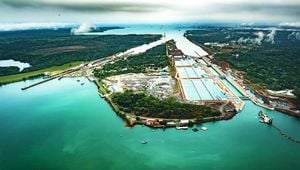At the recent Nigeria Petroleum Industry Leadership Forum held in Abuja, Mr. Tony Elumelu, the Chairman of Heirs Energies, delivered a pressing message about the future of Nigeria's economic diversification. He underscored the dire need for increased oil production as a foundational element to finance the country's shift away from its heavy reliance on oil revenues.
Elumelu stated, "You know, under Buhari’s administration, we dropped less than one million barrels. We are happy... But we are not satisfied with... We want to take it to over two million. Because we know we need oil money to diversify Nigeria away from oil. And we need to have the money to help develop our country." This perspective was echoed by several industry leaders present at the forum, which included representatives from major oil companies such as OPEC, SEPLAT, Shell, Oando Energy, and the Nigerian National Petroleum Company Limited.
The event focused on strategies for effectively boosting Nigeria's oil productivity—currently at about 1.8 million barrels per day—compared to its OPEC quota. Elumelu pointed out the necessity for Nigeria to reach 2.5 million barrels per day, illustrating how oil revenues are indispensable not just for industrialization but also for energy security and infrastructural growth.
Today's focus on oil production reflects a larger narrative within Nigeria's economic policy frameworks. For years, the economy has felt the pressure of over-dependence on oil, linked directly to volatility on global oil markets. Yet, rather than retreating from oil, industry experts like Elumelu argue it should be viewed as the means to fuel broader economic ambitions.
Heirs Energies, which Elumelu heads, plays its part by currently producing around 53,000 barrels per day, highlighting the company’s role within this larger industry conversation. The investment made by his company, which acquired OML 17 from Shell, serves as both critique and model, showing how focused leadership can yield results even amid challenges.
Indeed, Elumelu's remarks call attention to the importance of collaborative efforts between government, private sector stakeholders, and investors. He urged, "We want to take Nigeria to over two million barrels. Because we know we need oil money to diversify Nigeria away from oil." This plea resonates with many within the sector as the nation grapples with integrating its oil wealth to encourage multiplicity in other economic sectors.
One of the pressing needs also discussed was how elevated oil production could stabilize the Nigerian naira and generate foreign exchange. Industry leaders at the forum were mindful of the fluctuated currency impacts, concerned about how Nigeria's economic position could be fortified against external shocks if production targets are met.
The consensus among participants was clear: Nigeria finds itself at the crossroads of opportunity, where oil revenue could serve as both the lifeblood and the lever for economic diversification. Improved oil production levels not only promise direct financial benefits but also catalyze job creation and infrastructure improvement across various sectors.
The environment at the forum depicted optimism, with stakeholders exploring practical measures to achieve the collective goal of enhanced oil output. Elumelu referenced the current administration of President Bola Tinubu's strides, appreciating the improvement yet stressing insufficient progress against what Nigeria could achieve.
It is this nuanced balance between leveraging existing advantages within the oil sector and innovatively diversifying the economic base which could capture the imagination of policymakers and investors alike. With billionaires like Elumelu leading conversations on this topic, there’s growing hope for progressive economic strategies.
Elumelu’s call for collaboration cannot be overstated: addressing the challenges of Nigeria’s oil industry will require unity and innovative initiatives between all sectors. The forum served as both celebration and challenge—celebration of Nigeria's oil history and challenges of its future potential.
The Nigerian oil sector stands as both opportunity and conundrum. The calls from the industry speak volumes; the path forward must embrace oil revenues as foundational to economic transformation without falling prey to the historical pitfalls of over-reliance. With effective strategies and commitment from all stakeholders involved, Nigeria may well transform its oil wealth from dependency to diversified economic strength.



